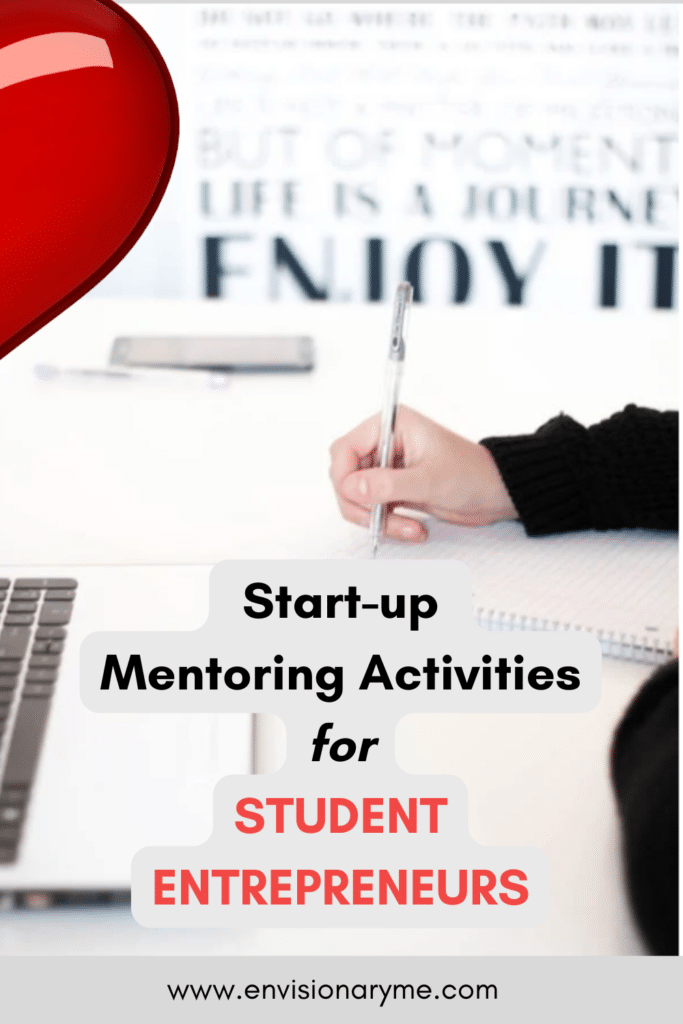Mentorship activities designed to support opening and running a business are especially helpful to entrepreneurship majors. Mentors help mentees gain learnings from activities offering exposure, new business experience, and insights into areas such as planning, managing finances, and how to bring a product to market. Mentorships designed to support their future start-up needs enhance their entrepreneurial spirit while helping create an experience that is critical to their future success.

As an entrepreneurship major, you need a starting point and exposure to business activities you will encounter when you start your business. Developing a mentorship plan that includes how to create a business plan, how to open a business, and providing exposure to basic financial documents and business processes is of great value.
Your mentorship program is where you begin to futureproof yourself.
Entrepreneurship majors: help your mentor to help you.
Mentors help create your path.
The activities you choose are strategic. Whether your mentor has opened a business of their own, or otherwise participated in the startup community, they have been there. They have experienced having no idea what to do next, and hitting expected and unexpected hurdles. They have needed to figure out how to budget and make do when the bills hit every month, and killing your credit isn’t an option.
They’ve experienced innovation that went nowhere, met with investors, and faced fierce competition.
Work with a single great mentor or create a team with specialized skills. Know they expect to provide feedback on startup business ideas and guidance. They can provide insights on the seed stage, business development, and whether an idea is viable. If they are over-scheduled but want to help, work with their available time, and lead with goals and solutions to get you where you need to be.
The thought behind a goal may be a wide open “now what?” or “I don’t know how to get started.” It can be anything as long as it’s what YOU need. Together, you’ll zoom into the details, create clarity around that objective and turn it into a set of SMART goals.
As a future business leader and founder, this is an important time for you. Don’t just fulfill a requirement with your mentorship program. Do Not simply go through the motions and check the required box.

Before venturing further… select your partner on this mentorship journey.
Professional mentors come from all walks of life!
Whether your perfect partner turns out to be a fellow young entrepreneur & soon-to-be graduate or alumnus, an advisor in your own field of expertise, an experienced entrepreneur who you met through a student entrepreneurship club, or somewhere totally different – your mentor provides an opportunity for you to learn and will help you determine your next steps.
Perfect mentors come in all shapes, sizes, ages, industries and walks of life. How awesome would it be to meet someone who worked alone in a library and had a wealth of knowledge and a vast network they couldn’t wait to share with you? It’s important to keep an open mind.
The “Entrepreneurship Mentorship” In Action!
Before jumping into selecting activities, preplan.
· Select your mentor
· Get acquainted with your mentor
· Discuss your dream business and the goal of your mentorship.
Of course you are thinking about how you’ll use your degree and what you’ll do after graduation. If you plan on starting a business, give serious thought to your short-term and longer-term goals, what you need to get started, and your optimal timeframe.
Consider your future business.
Consider its loose framework.
Ø What is your product or service?
Ø Why do consumers need your product? What is your vision and mission?
Ø What will it take to get your product literally into the hands of a consumer?
Ø What resources need to be in place in order for you to open your business? What skills, space, legalities, and other factors must you consider?
Once you start, you will break your days and weeks down into business needs and priorities. You will need a guide – a framework – a business plan. Call it whatever you want. None of this needs to be complicated. You just need to have it.
Maybe you started your business plan already. Maybe this is the first time you are considering it.
If have not started building the business plan, there you go. You nailed the objective of your mentorship.
Now think about your current skillset.
Ø What are your business and leadership skills?
Ø What are your technical skills?
Ø What soft skills do you have?
NOW it’s time for you and your coach to identify your gaps!
Once you know what you have and do not have vs. what you need, you are ready to select activities!

ENTREPRENEURIAL ACTIVITIES Across 6 Business Areas
1. How to get started
2. Finance
3. Manufacturing
4. Sales & Marketing
5. Customer Service
6. Human Resources
Yeah, Yeah, Yeah… I get it – you are not a large company. No, you do not need to create these departments!
However, you will have business needs that fall into each of these buckets.
You want the exposure so you have an idea of what will happen and how to handle it.
As you select your mentorship activities, consider these factors.
Ø Relevance – Does the activity connect with your objective, and does it offer results that will positively impact your new business?
Ø Timing – Does the activity work nicely with your existing schedule, so you’ll follow through and maximize your time?
Ø Metacognition – Know yourself as a learner and make sure the activity fits you, so you are more likely to follow through.
1.) How to get started
· Activity: Create your business plan. Nothing complicated. Nothing overwhelming. A sketch fine. Think through what you’ve got, what you’ll need, where you are going to work every day, and commit. It’s your starting point; build upon it as you go. Are you creating an LLC? Will you be taxed as a sole proprietor? Yes? Then your objective includes reviewing tax considerations and deductions. No? Then skip this.
· Activity: Have a discussion. Topic: learn if your business will have tax or legal considerations. Maybe it’s something, maybe nothing. Do you have any need to consider compliance? Protect yourself. Know what’s required and when.
· Activity: Meet with a CPA. Taxes will affect you year one. Know what information to track and maximize consequences in your favor.

2.) Finance
Indicate you know your assets and liabilities, and are planning and focused! You do not need anything intricate or fancy. Audits are not your first consideration, but you must know what’s coming in, going out, where you can save, what expenditures pay off, and when to expect to be in the green.
· Activity: Review / discuss examples of a small business budget. Create your own basic budget. If you have $10 or $1000. Know how you can/will use your current assets.
· Activity: Review / discuss an actual profit and loss statement; then create your own.
· Activity: Open a checking account for your business, use it, balance it. Even if it’s simply in your name, shop around; do not incur a cost. It’s an activity.
*Life Skills Note: Some people have never needed to balance a bank account. Some have never seen a check, and are dumbfounded when certain legal forms must be accompanied by a voided check. A what?? Yes. A voided check. Starter checks are not personalized to you and therefore, do not count. We don’t know what we don’t know!
3.) Manufacturing
This topic includes your process, your cost of goods, and cost of goods sold.
· Activity: Case study: Understand cost of goods sold. Gain insights to help determine how much it will cost to get your product into a customer’s hands and the effects of scaling. Sometimes scaling is possible and generates higher profit. Sometimes remaining small and uncomplicated yields greater monetary rewards.
· Activity: Visit a small business that creates on site. Consider where you put this product together. Know whether space or outside warehousing will ever be necessary. Know if your service requires a truck or if your product requires cold storage that will soon outgrow your space at home.
· Activity: Participate in an online group or association relating to your business. Learn how they maximized this process as a startup and how they grew.

4.) Sales & Marketing
The sales team – You – the lifeblood of every business – of Your business. Let’s make sure you are ready to GO.
· Activity: Visit a company selling direct to consumer, and shadow a person selling.
· Activity: Formally define your brand strategy, and your target market.
· Activity: Review fundamentals and latest trends with a small brand marketer.
5.) Customer Service
As soon as you sell it, you are faced with reviews and returns. Know how to maximize the positive as part of your marketing strategy. Know how you will act and honor returns and complaints.
· Activity: Role play: Your mentor is a satisfied customer or seeking more information. How will you maximize this positive opportunity, and possibly share it with others?
· Activity: Role play: Your mentor is an unhappy customer due to the product expectation and a shipping issue. Consider how to respond with a resolution in mind. Also consider how even if the expectation was unreasonable, how a live vs. a public negative review may affect your rate of new purchases and repeat purchase opportunities.
· Activity: Shadow a customer service representative to understand how responses are crafted.
6.) Human Resources
A very young company does not need a department and won’t need to hire a full HR service for a while. However, as soon as you need help, you need to consider this function. Do you hire, barter, or use a service? How will you pay them and handle the various taxes? How will you train them?
Be aware of your options.
· Activity: A learning discussion. When did your mentor need help? What action was most appropriate?
· Activity: Plan for your needs. If simply bartering or partnering on a table at a craft fair is effective, perfect. If you need no one… perfect, put this topic aside for a while.
· Activity: Create your own succession plan!
Mentorship programs for entrepreneurship students are as creative as an entrepreneur’s own mood board! It’s a most effective way to receive guidance and professionally develop before graduation in preparation to launch your own business.
Take this time to utilize every opportunity relating to your mentoring program objectives. Use your mentor’s seasoned professional advice about early-stage ventures, and use their network to expand your own.
Mentees should appreciate the perspective, use it to accelerate their learning, and take in the positive reinforcement! Aspiring entrepreneurs need to be flexible when designing an activity path. Consider best practices, build upon your path, change it up – just as you will when running your successful business.
Soon you will reap the benefits of a positive outcome. You are on your way!

0 Comments